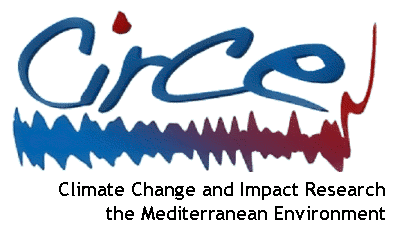

Project objectives
The main objectives of CIRCE are to predict and to quantify the physical impacts of climate change in the Mediterranean, and to assess the most influential consequences for the population of the region. The knowledge yielded by the different specialised investigations will then be linked in an integrated inter-disciplinary approach designed to study the total effect of climate change. CIRCE will integrate cutting-edge scientific research with the needs of end-users and communities. Thus, CIRCE will be able to quantify the impact of global warming on Mediterranean climate variables, whilst also taking into account the regional social, economic and policy aspects of the process. In this way, CIRCE will make a powerful contribution to the definition and evaluation of adaptation and mitigation strategies.
Recent observed changes in climate variables will be documented. Detectable trends and variability will be identified and described, and then compared with a series of possible explanations. An optimal mix of plausible forcing factors will be derived as the best explanatory interpretation of ongoing changes. In this way, a comprehensive set of data describing the physical impacts of climate change will be developed, and then used to assess the consequences of climate change for human society and ecosystems. CIRCE will analyse a number of climate parameters including: temperature, precipitation, atmospheric humidity, wind, waves, sea-level rise, surface radiative fluxes, balance between evaporation-precipitation, saline output to the Atlantic, water vapour export, frequency and distribution of extreme events, nutrient load into the sea, and sensitivity to water stress. CIRCE will build on the extensive modelling experience already available, but it will develop specific modelling scenarios for the Mediterranean, in terms of resolution, process and feedback inclusions, understanding and specific diagnostic studies for the Mediterranean area.
The impacts of climate change will be analysed and evaluated in their oceanographic, meteorological, ecological, economic and societal dimensions. Information will be provided in terms of economically meaningful variables such as productivity changes, variation of resource stocks, shifts in technology and demand patterns. Economic consequences for agriculture will be evaluated through estimation of agricultural productivity, management and profit. Similarly, impacts on forestry and on biodiversity will be investigated. CIRCE will focus particularly on the direct economic impacts for four crucial sectors for the Mediterranean region: health, tourism, energy demand, and human migration. The project will provide the advances required to meet policy needs in these sectors. To do that CIRCE aims to build a new vision of the interactions between climate factors and socio economic evolutions trying to overcome two classical obstacles faced by a number of research projects on climate impacts.
The first obstacle is often the imbalance between physical and natural science and social sciences. In Circe this imbalance has been corrected and social sciences are a strong component of the project. CIRCE brings together the natural sciences community and social community in a new integrated and comprehensive way.
The second obstacle is linked to the first, a climate all vision of society that is to put climate as the major constraint of human behaviour to understand adaptation. This bias is sometimes necessary for the needs of modelling but then produces irrelevant elements of analysis for policy making. A more realistic approach is needed to match stakeholders and policy makers demands.
Most climate impact assessments so far have focussed on a causal chain from climate change to economic and social impacts, adaptation policies being the direct responses to climate impacts.
CIRCE analyse climate impacts as the joint product of climate change and socio economic dynamics/ human behaviour which are most of the time independent of climate change. In this non linear approach, impacts of climate change are analysed with reference to specific socio economic scenarios, with particular attention to relevant sector and policies which can actually emphasize or reduce effect of climate change. On the other side responses strategies are not pure adaptation responses to climate change but a mix of long trends evolutions, progressive reorientation of sectoral policies which can also have positive or adverse effects on resilience or vulnerability to climate change. CIRCE makes a strong point in producing relevant research for the actors of the region. For that reason it is essential to provide assessments that can be integrated in practical decision making, therefore this more comprehensive method is necessary and more able to represent the reality as many impacts on health, tourism, migration, etc. cannot be reliably expressed as a function of climate change alone. The end result of the political economy of economic and social policies of the region will not be climate first but development first for a number of years to come. Keeping that framework in mind give the best chance to reach relevant actors and improve relevant strategies. That is the underlying concept of the CIRCE project